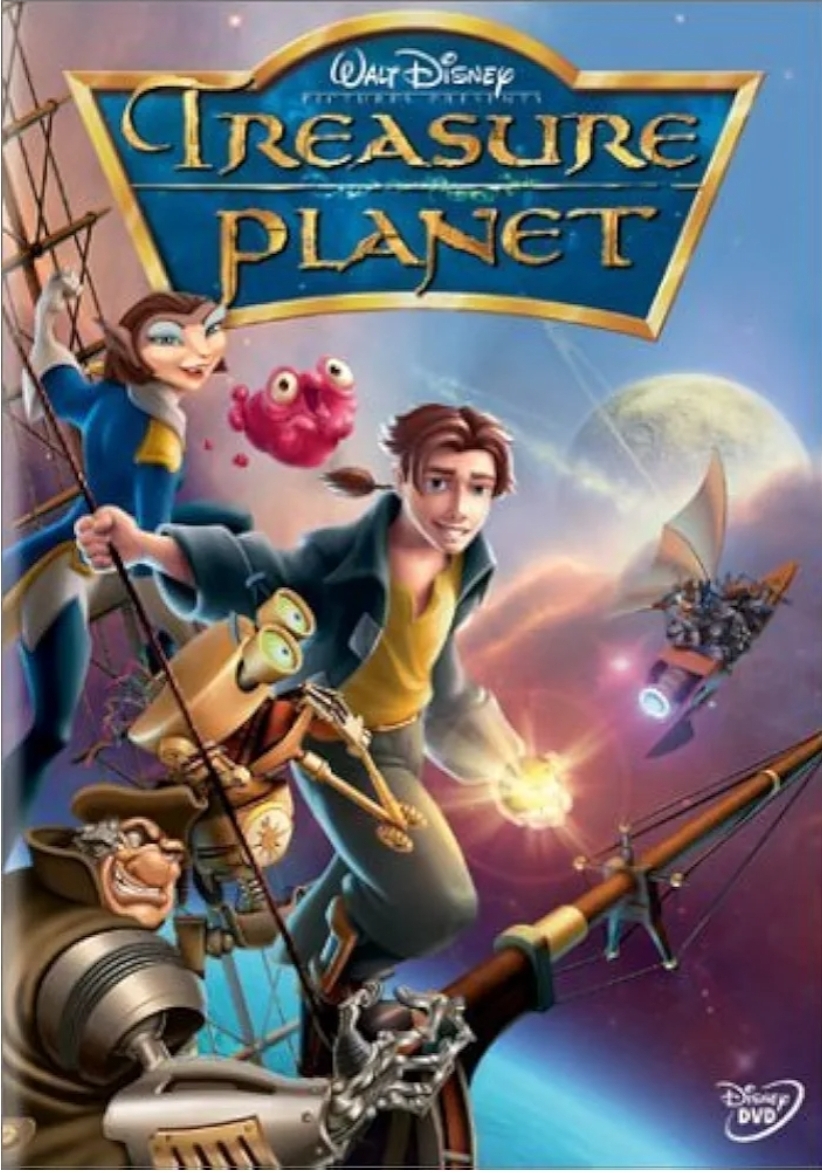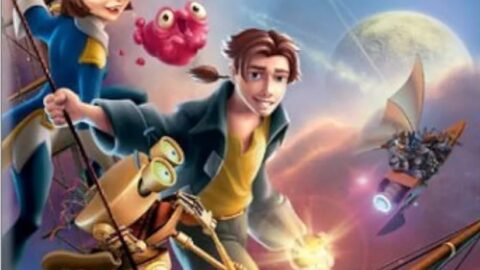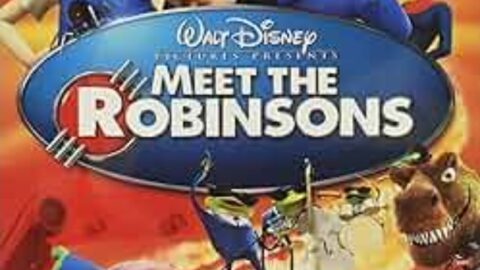Core Question: What turns a reckless boy into a trustworthy man?
Tagline (spirit): “You’ve got the makings of greatness in you — greatness shaped by Agápē.”
What is Agápē?
In classical Greek, there are four common words for “love”:
- Agápē — sacrificial, unconditional love; wills the good of the other, even at personal cost.
- Érōs — romantic/erotic desire; attraction and longing.
- Philia — friendship/affection; comradeship shaped by shared virtue.
- Storgē — familial love; natural affection within family bonds.
Why Agápē fits Treasure Planet
- A pirate chooses a son over a fortune
At the moral crux, John Silver lets the treasure go to save Jim from the collapsing planet. That’s agápē distilled: your life over my life’s obsession. - Fatherhood by choice heals father-wounds
Jim’s absent-dad ache is real. Silver’s tough, tender mentoring—teaching seamanship, speaking destiny into Jim—turns storgē (the love he lacked) into agápē freely given. - Philia forged under fire
Captain Amelia, Doppler, and the loyal crew risk themselves alongside Jim. Their comradeship (philia) matures into shared virtue—competence, courage, and trust aimed at each other’s good. - Vocation over validation
Jim starts as a thrill-seeker on a solar surfer, starved for approval. Agápē re-aims his gifts toward service—navigating the portal to save everyone and later pursuing a life that builds, not just dazzles. - Counterfeit loves unmasked: greed & glory
Scroop and the mutineers treat people as tools of plunder. Silver begins there too, but agápē converts him; greed promises wholeness and delivers isolation. - Truthful care, not coddling
Silver challenges Jim—no excuses, real standards—while never withdrawing affection. That blend (warmth + demand) is agápē’s pedagogy: call out and call forth. - Mercy that sets a captive free
Jim lets Silver slip away instead of turning him in, then receives a covert gift of treasure for the Benbow and his future. Agápē reciprocates: justice tempered by mercy, mercy yoked to growth. - Love widened to a crew and a world
Rescuing enemies, stabilizing the ship, rebuilding the inn—personal bonds blossom into civic care. Agápē becomes institutional: homes restored, vocations launched.
Symbols that point to Agápē in Treasure Planet
- Solar surfer → talent tamed for rescue; thrill → vocation.
- Spherical map / portal → power that must be ordered to persons, not plunder.
- Silver’s cyborg arm & eye → capability without a heart is dangerous; love humanizes power.
- Morph → playful loyalty; affection that follows you into fire.
- Benbow Inn (ruined → restored) → love rebuilding a commons.
- Black-hole collapse → the soul-implosion of greed; only self-gift holds.
- The coin Silver leaves → secret provision; father-love that funds a future.
Quick takeaway
Treasure Planet argues that the real treasure isn’t in a vault—it’s agápē: a pirate who becomes a father, a prodigy who becomes a protector, and a crew that spends skill for one another’s good. When that love leads, storgē is reborn, philia turns brave, érōs for glory is purified—and a map meant for plunder becomes a doorway to becoming.
The Wound and the Want
Moral Core: Abandonment, anger, and the hunger for significance
Jim Hawkins grows up on tales of Flint’s hidden treasure, then on the reality of a father who walks out. He becomes a thrill-seeking delinquent—half daring, half despair. When a dying pirate delivers a map sphere to the fabled Treasure Planet, Jim sees a way to prove he matters.
Lessons
- Recklessness is often grief in motion.
- The desire for glory can mask a deeper need for belonging.
- A wound (fatherlessness) can become a false compass.
Philosophical Frame
- Existentialism (Sartre): Jim tries to self-author meaning through risk.
- Attachment theory: Acting out as a response to insecure bonds.
The Voyage and the Mask
Moral Core: Temptation of mentorship; the double face of guidance
Jim joins the voyage under Captain Amelia (discipline) and meets the cyborg cook John Silver (warmth). Silver secretly leads a mutinous crew, yet becomes the father-figure Jim never had—teaching him to splice sails, hold a course, and believe in himself. The bond is genuine, the motive mixed.
Lessons
- Mentors shape destiny—for good or ill—because they lend us their confidence.
- People can be both sincerely caring and morally compromised.
- Trust without testing becomes credulity; suspicion without openness becomes isolation.
Philosophical Frame
- Aristotle’s virtue ethics: Character grows by habituation—Amelia through discipline; Silver through encouragement—Jim needs both.
- Machiavelli vs. Augustine: Is care a tool (Machiavellian) or a virtue (Augustinian)? Silver blurs the line.
Mutiny, Betrayal, and the Middle Choice
Moral Core: Integrity under pressure
The mutiny erupts. Silver reveals his aim to seize the treasure, but he won’t sacrifice Jim when forced to choose. Jim discovers B.E.N., the amnesiac robot, and a clue: Flint booby-trapped the planet with a planet-killer mechanism. The treasure hunt becomes a test of what Jim values more—gold or goodness.
Lessons
- Crisis exposes true loyalties.
- Greatness is not found but chosen—in the moment you refuse the expedient wrong.
- Friendship can redeem a scoundrel, and love can discipline a rebel.
Philosophical Frame
- Kantian duty: Some actions (protecting others) must be done regardless of payoff.
- Girardian desire: Treasure (status) is mimetic; we want it because others do. Breaking the spell requires a superior love.
The Cataclysm and the Leap
Moral Core: Sacrifice as the birth of manhood
Flint’s trap detonates. Amid collapse, Silver can flee with vast riches or save Jim. He chooses Jim—dropping the treasure to grasp the boy’s outstretched hand. Jim then risks his life to solar-surf a makeshift skiff through the collapsing portals, steering everyone to safety.
Lessons
- Manhood = responsibility: choosing a person over a prize.
- The right mentor finally appears when the student chooses virtue.
- Courage is competence in service of love.
Philosophical Frame
- Virtue ethics (magnanimity): Great-souled acts align skill with moral purpose.
- Agapic ethics: Love that loses to save is the highest form of power.
The True Treasure
Moral Core: Reframed identity and redeemed fatherhood
Silver escapes justice but leaves Jim a seed-gift (a gemstone that funds the Benbow Inn’s rebuild) and a charge: “Make me proud.” Jim enters adulthood—academy uniform, clear eyes—yet keeps the solar surfer’s joy. Silver’s face appears in the clouds: not a ghost, but a symbol—the flawed father who chose rightly at the end.
Lessons
- The real treasure is character + calling, not coin.
- Redemption is relational: a scoundrel becomes a father when he sacrifices.
- Keeping your core joy while embracing duty is maturity, not compromise.
Philosophical Frame
- Eudaimonia (Aristotle): Flourishing = excellence of character in a life of purpose.
- Narrative identity (MacIntyre): Jim rewrites his story from wounded boy to trustworthy man.
Symbols & What They Mean
| Symbol | Meaning |
|---|---|
| Map Sphere | Destiny as puzzle: potential unfolds when you learn to open it wisely |
| Solar Surfer | Risk harnessed by skill; freedom refined into excellence |
| Cyborg (Silver) | Human warmth fused with instrumental ambition; the divided self |
| Treasure Planet Mechanism | Booby-trapped desire; wealth that detonates the soul |
| Amelia vs. Silver | Discipline and affection—both required to form a whole person |
| B.E.N.’s “lost memory” | Morality without memory becomes chaos; tradition matters |
Core Themes (with Real-World Applications)
- Father Hunger & Mentorship
- Lesson: A single voice of belief can change a life; mix warmth with standards.
- Apply: Coaching, teaching, parenting: pair encouragement with expectation.
- Ambition vs. Integrity
- Lesson: Talent without truth becomes piracy.
- Apply: In careers, tie advancement to character metrics, not just performance.
- Freedom → Responsibility
- Lesson: The thrill that once numbed pain becomes purpose when yoked to duty.
- Apply: Channel youthful risk into mission (entrepreneurship, service, rescue professions).
- Redemption Through Choice
- Lesson: One decisive sacrifice can reverse a life’s vector.
- Apply: Practice pre-commitments (what you’ll give up for whom) before the crisis.
- Booby-Trapped Treasure
- Lesson: Some wins cost your soul.
- Apply: Design ethical tripwires—if success requires secrecy or betrayal, it’s not success.
Character Arcs (as Moral Progress)
| Character | Starting Vice/Need | Transforming Moment | New Virtue |
|---|---|---|---|
| Jim Hawkins | Recklessness; father wound | Risks life for crew, not glory | Courage with responsibility |
| John Silver | Greed; instrumental love | Drops treasure to save Jim | Sacrificial love |
| Captain Amelia | Stoic professionalism | Trusts Jim’s initiative | Prudent trust |
| Dr. Doppler | Timid intellect | Acts bravely, protects Amelia | Applied courage |
A Practical “Treasure Planet” Checklist (for life, teams, leadership)
- Who is your Silver? Seek mentors who believe in you and tell you no when needed.
- What’s your booby-trapped treasure? Identify wins that would demand a betrayal.
- Skill to Service: Convert a personal thrill (your “solar surfer”) into a public good.
- Pre-decide your sacrifice: Name the person/values you’ll choose over the prize.
- Honor mixed people: Acknowledge good from flawed mentors while rejecting their vices.
Final Reflection
Treasure Planet isn’t just about finding gold among the stars; it’s about finding adulthood. Jim learns that greatness isn’t a destination hidden by pirates—it’s a virtue forged by wounds, chosen under pressure, and confirmed by sacrifice. Silver’s last gesture says the quiet part aloud: the real map doesn’t point to a planet; it points to the person you could become—if you dare to steer by the right star.







